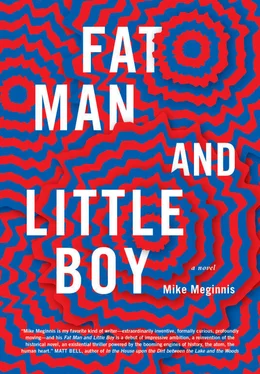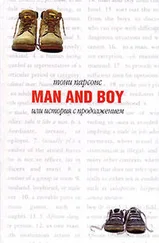“How did you do this?” he asks them.
Little Boy clutches the stillborn against his chest as if the father is a hungry thing. Fat Man might know what’s being asked. He might recognize the words.
The father says, “Before you came, before the Americans, everything was fine. How did you put babies inside them?”
Fat Man says, “What?” He asks in Japanese.
The father advances on the brother bombs. “How did you do it to my pigs? How are you to blame?”
Fat Man understands “how.” He understands “blame.”
There is motion in the dark. The daughter cradles her mother’s rubber body behind the table. The mother is breathing like she does not mean to do it.
Fat Man searches for a weapon. Little Boy trembles and crawls behind his brother. “Help me brother! Save me!”
The naked father lunges. He sinks the cleaver into Fat Man’s shoulder. Blood sprays the wall. The father pulls the knife loose, and Fat Man is screaming, he lashes out at the air. The father wipes the blood from his eyes with the back of his hand—it smears, a sticky stripe. His left eye is stuck closed and the right is spiderwebbed with angry veins. They breathe into each other’s noses and mouths, they taste the sour inside each other, they hear the rush of air. Fat Man is still screaming. He is squeezing his shoulder when he should be fighting back.
Little Boy has fallen to his side. The baby rolls like an empty jar. Little Boy knows what it’s like to explode. It’s like this. He is going to explode. He can feel the awful, acid heat inside him between icy bones and sizzling skin. He feels the vertigo of expansion—the giddy over-filling of a straining bright balloon.
He is a bomb again, he is a bomb again, he is a bomb exploding.
Fat Man falls on his back, the naked father is on him. The naked father cleaves the ground beside his ear.
“The baby,” shouts Fat Man as he claws the father’s face and peels of skin bunch up beneath his nails.
Little Boy puts his thumb in his mouth. It soothes him. The expanding inside does not expand, but pulsates, hot and cold, too much and too little, in and out, boy and bomb and boy and bomb. He sucks his thumb.
Fat Man hits the father with the cash case. The father carves a corner from his ear. His blows are wild. Fat Man hits him with the suitcase again, and again: flat, dull thuds. Until a golden corner finds the father’s temple.
The body now is like the stillborn baby, but so heavy. Fat Man holds the suitcase in both hands and brings it down like a guillotine, smashing the father’s head against his own breast. The skull gives. Warmth flows over his chest. Fat Man knows that he is screaming, has known from the start. He means to continue.
Little Boy is safe. He opens his eyes and unclamps his teeth from around his thumb. He has fouled himself. In this dark the stillborn’s body looks like pink-blue sand dunes sloping toward oblivion. The limbs are all wrong, the head all crushed, like the father’s now.
Fat Man pushes the father’s body from his body. Their blood is everywhere and looks identical.
“What did you do to him?” says Little Boy.
“What did you do to him ?” says Fat Man, indicating the stillborn.
“I nearly exploded,” says Little Boy. “I was so scared.”
Little Boy puts his blanket over the stillborn and takes the still-living baby from his brother’s bed. The baby has been wailing; now it stops. To stare at Little Boy with moony, tired, porcine eyes.
“I did explode,” says Fat Man.
The women are asleep in the kitchen. For the first time, the brother bombs see the sleeping mats the family hid beneath the table. Little Boy places the living baby down with the daughter, its mother. Fat Man goes through their food stores. He takes their rice bag and their small portable stove. He takes their stores of pork and drops them in the rice sack.
Little Boy says, “I don’t think we should do this. We just killed their father.”
“You talk as if he didn’t try to kill me first,” growls Fat Man. “Besides, I’m starving. Every time I asked for seconds she just stared at me. As if she couldn’t work out what this meant.” Fat Man holds out two fingers insistently—two, two, two.
Little Boy rubs his eyes. The newborn watches them silently. It’s trying to read them, as Little Boy tried to read its stillborn brother.
“Would you even care if I died?” says Fat Man. His brother answers with a glare. Fat Man clenches his hand. “You hid behind me. You were supposed to protect me and you hid behind me instead. How can you question me?” The gash in his shoulder sings like an old brass bell. “You stink,” he says. “Take off those pants.”
“I told you not to take their food!”
The daughter stirs. She sees the bloody giant standing over her with her family’s rice, her family’s stove. She asks them, “Where are you going?”
“God damn it,” roars Fat Man, “I’m hungry! I’m hungry, and you’re done telling me what to do.” He rubs his palm over his face. He leaves the room and comes back with the blood-covered suitcase. The daughter understands what she is seeing. She shakes her mother hard. Fat Man opens the briefcase and hauls out great honking wads of cash. He hurls it at the women. The mother wakes. Some bills stick to them, sticky with blood. The rest fall around them like green confetti.
They harp and twitter with inscrutable questions, accusations, threats, pleadings. The newborn cries. There are open pigs on the table between them, all viscera and threads of fat. “Why did you kill him?” shouts the daughter. The mother fights to keep her eyes open. “Why did you kill him?” the daughter screams, again, again.
When the cash case is maybe too low and the women have been thoroughly feathered with dollars, Fat Man sets off running. Little Boy follows, still stinking in his soiled pants, and crying for the stillborn.
They sleep this night by the road, in the brush. They should leave the scene but they are too tired.
In the morning Fat Man makes all the rice the stove can hold and roasts pork over the flame. Little Boy takes a handful. Fat Man eats the rest.
Little Boy is wearing his other pair of undershorts, his dress shirt, his tie, and blue suit jacket. He left behind his hat. Fat Man slept in his bloodied clothes, now festooned with small green leaves, yellow weed blossoms, and a crushed spider’s legs. Between handfuls of rice he progressively disrobes himself—drops the jacket, opens his shirt, shrugs it off, pulls off his pants over his shoes. Shiny white grains of rice stick to his hands and face as he wolfs down the food.
“Why did he do that?” says Little Boy.
“I never claimed to understand the Japanese mind,” says Fat Man. He begins to dig at the dirt with his hands.
“Why was he naked?”
“Why am I naked?” says Fat Man. This is not strictly true—he still wears a too-small undershirt and a mostly-white pair of shorts, but so much of him spills out, and he is so pink, that the effect is very much that of a bare body. The shirt is red-stained on the shoulder, but not like the one he wore last night, which lies in the dirt, crusty and so red it’s almost black. “Like us, he had very few clothes to his name. He didn’t know who we were or who we knew—for all he could say, we had big, important friends with guns who would be coming by to check on us the next morning.” He rolls his sodden clothes into a heap and puts them in the shallow hole that he’s been digging. “Had he done otherwise, he would have ruined his clothes, and there would have been evidence. This way, had he killed us, he would only need to take a bath.” A disquieting thought crosses his face like a crow’s shadow. “And bury our bodies.”
Читать дальше












